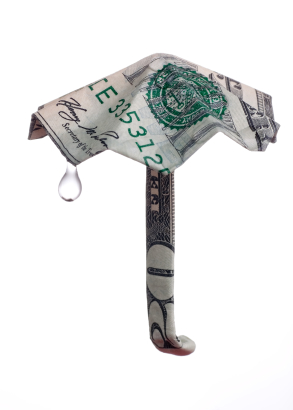Rainy Day Funds
A key element to secure finances is an adequate rainy day fund. This refers to available cash that can be used for a sudden financial reversal.
A reasonable stash of cash should be saved that can get you through a six or eight month period of a lost job, abrupt disability, prolonged sickness, or other unanticipated event. These funds should not be part of your asset allocation and should not be tied up in investments that would have to be sold at a loss if needed.
Included with this would be funds needed for specific purchases such as a car, boat or home redecoration. To carry this further, I would also include funds being saved for a house down payment or college tuition.
My basic rule is that this money should not be put at risk. Rainy day funds should be kept in a money market fund, savings, credit union account or very short-term bank CDs so that it will be fully available when needed.
Do not include these funds as part of the cash portion of your asset allocation. That will skew the formulas since these amounts are not really available for long-term investing. Cash as part of your asset allocation should be for strategic or rebalancing purposes and not short-term needs.
I do not believe funds should be invested in the stock market if your time horizon is less than seven years. For instance, funds needed in five years to start payments for a child’s college education should not be invested in the market. The third and fourth years’ payments which would be due in seven and eight years can be. This is because longer time periods have the ability to recover from market slides. But not always, so be careful how you invest.
Some people believe an alternative to a rainy day fund would be borrowing power with a credit card or home equity line of credit. It is. And – it doesn’t require funds to be tied up at minimal rates for something that might never occur. However, a downside is that these credit lines are not always guaranteed. They can be terminated pretty much at will, and this sometimes happens particularly if a job is lost.
Keeping liquid with your rainy day funds is a sensible way to remain secure.
How Can We Help?




